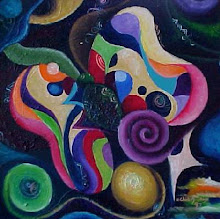Friday, April 2, 2010
Mayor of Casterbridge Question 9
Mayor of Casterbridge Question 6
Thursday, January 14, 2010
A Journey Through the Psyche
One of my most treasured and stimulating intellectual journeys was when I read Michio Kaku's book "Hyperspace". The book is a beautiful exploration of critical subjects such as the existence of other spatial dimensions, parallel universes, and the beginning of the universe (which Kaku theorizes could have been a tear in the space-time of some other universe). When I first looked at the book, I flipped to a section describing a theoretical story. It talked about a man who wanted to build a house out of an unfolded tesseract (a four dimensional cube). The house would like three cubes stacked on top of each other, with another layer of cubes protruding from the sides, and then a fifth cube by itself at the top. A man and his wife did not believe he could do it. Nevertheless, he proceeded to get it built, and actually succeeded. Now keep in mind he did not build something in four dimensions; it is simply a three dimensional outline of a four dimensional hypercube. Tragically, before showing the masterpiece to the skeptical couple, an earthquake hit and the house collapsed. When the couple and the man came to look at it, there was mysteriously one cube left. The trio entered inside cautiously, only to be shocked beyond their minds’ comprehension. What they saw was incredible. They could see a series of rooms go on for seeming infinity in front of them. Frantically, they tried to leave the house, but when they went out the entrance it only led to another room. They kept going through doors but they only led to other rooms! Eventually, they found a window. Upon looking outside they saw they were kilometers above the empire state building. Looking through another window, they were above the ocean. Through another window they saw infinite darkness. Simply nothing. Eventually, they found a window with a reasonable area to step into, and basically escaped through a portal in space. What had happened was when the earthquake occurred, the three dimensional outline collapsed back into a four dimensional hypercube! Reading this intrigued me. I wondered, and still wonder today, would it be possible to recreate such a wonderfully coincidental tear in the universe? Hopefully time will tell.
372 words.
